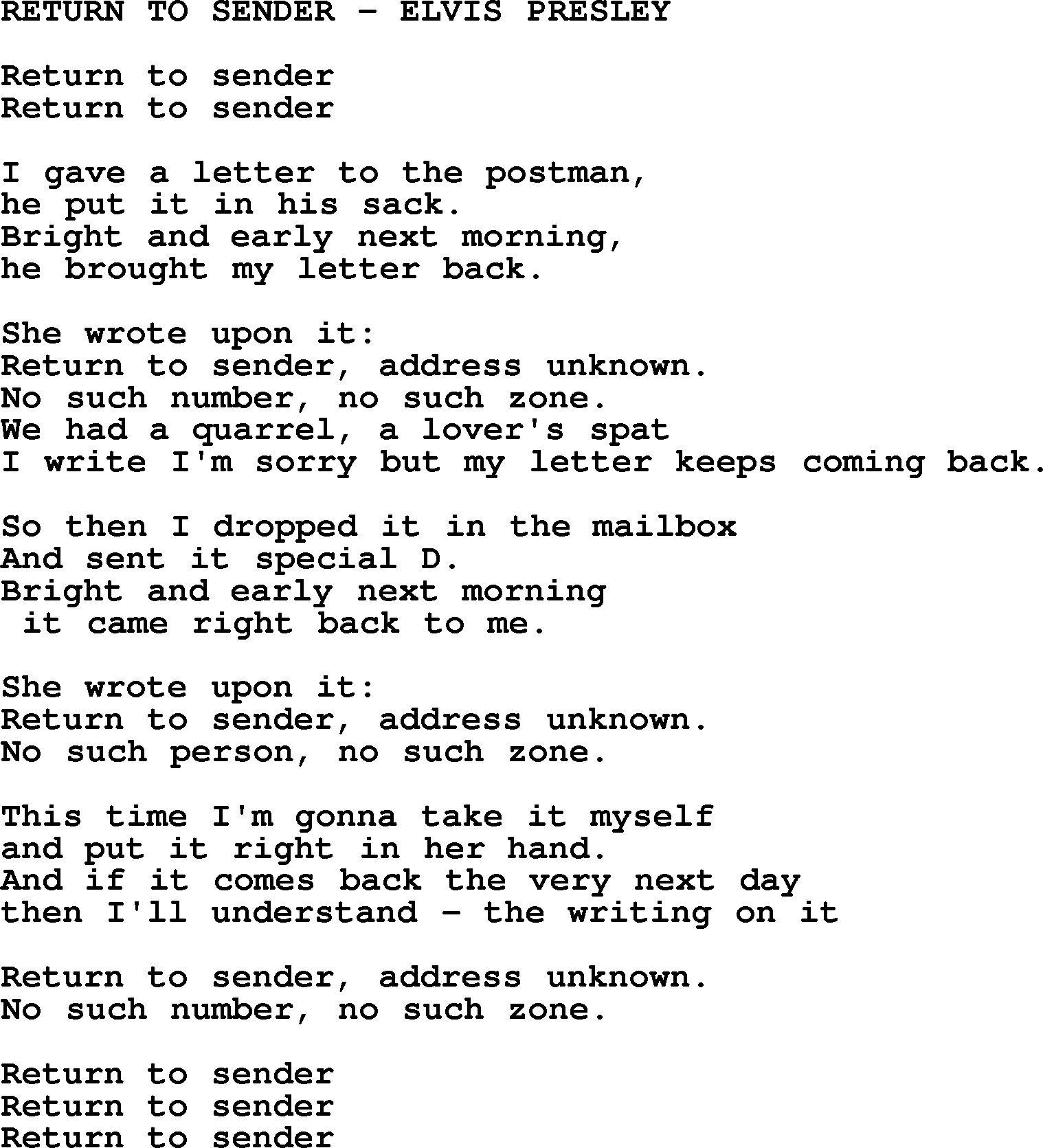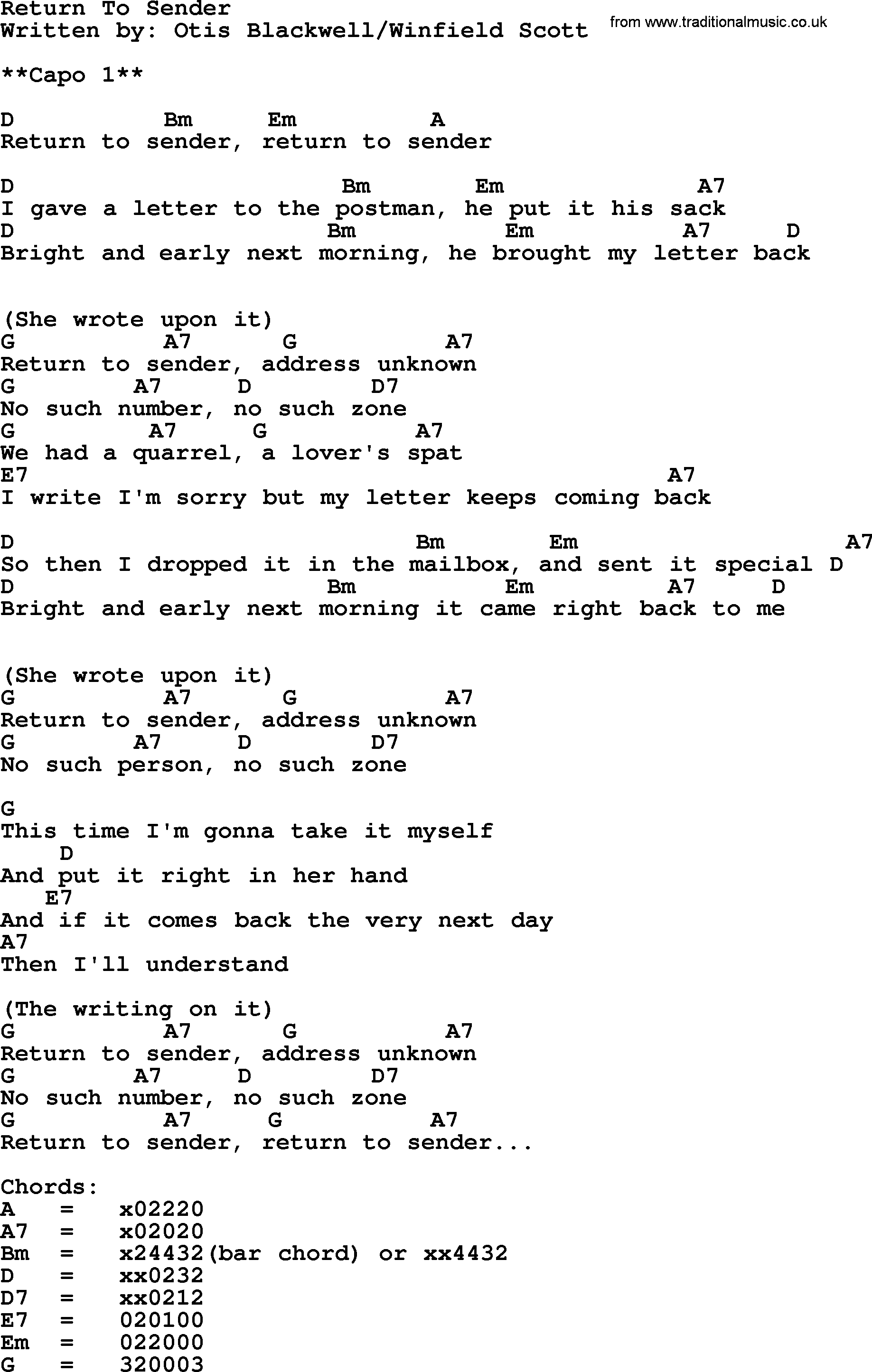When you think of the phrase "return to sender," it might remind you of a love letter gone wrong or an address that doesn't exist anymore. But when we tie this phrase to the name Elvis, we’re diving into something much bigger, deeper, and more iconic. "Return to Sender Elvis" isn’t just about music—it’s about legacy, nostalgia, and the timeless appeal of The King himself. So buckle up because we’re about to take a trip through the life, music, and cultural impact of Elvis Presley.
Elvis Presley was more than just a singer; he was a cultural phenomenon. His voice, style, and charisma transcended generations, and even decades after his passing, his influence is still felt worldwide. The phrase "return to sender" ties directly into one of his most famous songs, but it also symbolizes his journey back into our hearts every time we hear his music or learn more about his incredible story.
In this article, we’ll explore everything from the origins of the song "Return to Sender" to the man behind the legend. We’ll dive deep into his career, personal life, and the lasting impact he left on the world. Whether you’re a die-hard fan or someone curious about the King of Rock 'n' Roll, there’s something here for everyone.
- Molly Yeh Net Worth A Deep Dive Into The Life Career And Financial Success Of This Talented Chef
- Devale Ellis Net Worth The Inside Scoop On His Wealth Career And Success
Table of Contents
- Elvis Presley: A Brief Biography
- Early Life and Rise to Fame
- The Story Behind "Return to Sender"
- Elvis's Music Career
- Cultural Impact of Elvis Presley
- Elvis's Personal Life
- The Legacy of The King
- Elvis Memorabilia and Collectibles
- Elvis Fans Around the World
- Conclusion: Why "Return to Sender Elvis" Matters Today
Elvis Presley: A Brief Biography
Before we dive into the specifics of "Return to Sender Elvis," let’s get to know the man himself. Elvis Aaron Presley was born on January 8, 1935, in Tupelo, Mississippi. He grew up in a humble household with his parents, Vernon and Gladys Presley. From a young age, Elvis showed a keen interest in music, often singing in church and listening to gospel records.
His family moved to Memphis, Tennessee, in 1948, where Elvis began to develop his unique style by blending different genres like country, blues, and gospel. This eclectic mix would later become the foundation of rock 'n' roll, a genre that would change the music industry forever.
Biographical Data
| Full Name | Elvis Aaron Presley |
|---|---|
| Birth Date | January 8, 1935 |
| Place of Birth | Tupelo, Mississippi |
| Death Date | August 16, 1977 |
| Occupation | Singer, Actor |
| Spouse | Priscilla Presley |
Early Life and Rise to Fame
Elvis’s early years were marked by struggle and determination. Growing up during the Great Depression, his family faced financial hardships, but music became an escape for young Elvis. At 18, he walked into Sun Studio in Memphis hoping to record a demo for his mother’s birthday. Little did he know, this decision would lead to a meeting with Sam Phillips, the man who would help launch his career.
- Robert F Kennedy Jr Voice Unveiling The Power Of Advocacy And Leadership
- Kristen Stewart And Parents A Closer Look Into Their Bond
In 1954, Elvis released his first single, "That’s All Right," which quickly gained traction on local radio stations. The rest, as they say, is history. By the late 1950s, Elvis had become a household name, appearing on television shows and releasing hit after hit.
The Story Behind "Return to Sender"
Now, let’s talk about the song that ties everything together: "Return to Sender." Released in 1962, this track was part of the soundtrack for the movie "Girls! Girls! Girls!" starring Elvis himself. Written by Hugo Peretti, Luigi Creatore, and Aaron Schroeder, the song tells the story of unrequited love through the metaphor of a letter being returned to its sender.
What makes "Return to Sender" so special? Well, it’s not just the lyrics—it’s the way Elvis delivers them. His voice carries emotion, longing, and vulnerability, making the song resonate with listeners across generations. Plus, the catchy melody and memorable hook ensure that once you hear it, you can’t forget it.
Why "Return to Sender" Still Resonates Today
- Its timeless theme of love and loss continues to speak to audiences.
- The song’s melody and arrangement remain fresh even decades later.
- Elvis’s vocal performance adds layers of depth and authenticity.
Elvis's Music Career
Elvis’s career spanned several decades and genres, cementing his status as one of the most versatile artists of all time. From rock 'n' roll to ballads, gospel to blues, Elvis proved time and again that he could adapt to any style while maintaining his signature sound.
Some of his biggest hits include "Heartbreak Hotel," "Jailhouse Rock," "Can’t Help Falling in Love," and "Suspicious Minds." Each of these songs showcases a different facet of his artistry, proving why he’s often referred to as the King of Rock 'n' Roll.
Key Milestones in Elvis’s Career
- 1956: Appearance on "The Ed Sullivan Show," introducing millions to rock 'n' roll.
- 1968: The "Elvis Comeback Special," revitalizing his career after years of decline.
- 1973: "Aloha from Hawaii," a globally televised concert that broke records.
Cultural Impact of Elvis Presley
Elvis didn’t just influence the music industry; he shaped popular culture as a whole. His fashion, dance moves, and charisma inspired countless artists and fans alike. In fact, many consider him a trailblazer for breaking racial barriers in music by blending black and white musical traditions.
Even today, Elvis remains a pop culture icon. His image adorns everything from T-shirts to tattoos, and his music continues to inspire new generations of listeners. Graceland, his former home in Memphis, attracts thousands of visitors annually, proving that his legacy lives on.
Elvis and Racial Integration in Music
During a time when segregation was rampant, Elvis openly admired and incorporated African American music into his work. This not only helped bring rock 'n' roll into the mainstream but also challenged societal norms. Artists like Little Richard and B.B. King have credited Elvis with helping to bridge the gap between different communities through music.
Elvis's Personal Life
Beyond his public persona, Elvis led a complex personal life filled with highs and lows. He married Priscilla Beaulieu in 1967, and the couple welcomed their only child, Lisa Marie Presley, in 1968. However, their marriage ended in divorce in 1973 due to differences in lifestyle and priorities.
Toward the end of his life, Elvis battled health issues and struggled with addiction. Despite these challenges, he continued to perform until his untimely death in 1977 at the age of 42. His passing shocked the world and left a void in the music industry that has yet to be filled.
Lessons from Elvis’s Life
- Success comes with its own set of challenges.
- It’s important to balance personal and professional life.
- Legacy is built not just through talent but through authenticity.
The Legacy of The King
Decades after his death, Elvis’s legacy continues to thrive. He paved the way for countless musicians and remains a symbol of rebellion, passion, and artistry. His music has been sampled by modern artists, and his influence can be seen in everything from hip-hop to country.
Graceland serves as both a museum and a shrine to his memory, offering fans a glimpse into his world. And while "Return to Sender" may remind us of a love lost, it also reminds us of the enduring power of Elvis’s music and message.
Elvis Memorabilia and Collectibles
For fans of "Return to Sender Elvis," collecting memorabilia is a way to connect with the man and his music. From vinyl records to concert posters, there’s no shortage of items available for collectors. Some of the most sought-after pieces include:
- Original pressings of his albums.
- Signed photographs or autographs.
- Costumes worn during his performances.
These items not only hold sentimental value but also serve as reminders of the impact Elvis had on the world.
Elvis Fans Around the World
Elvis’s fan base is as diverse as his music. From dedicated collectors to casual listeners, people from all walks of life find something to love about The King. Annual events like Elvis Week in Memphis bring together fans from around the globe to celebrate his life and career.
These gatherings aren’t just about nostalgia; they’re about community. Fans share stories, swap memorabilia, and keep the spirit of Elvis alive through their passion and dedication.
Conclusion: Why "Return to Sender Elvis" Matters Today
As we’ve explored, "Return to Sender Elvis" represents much more than just a song. It’s a testament to the enduring legacy of a man who changed the music industry forever. Whether you’re moved by his voice, inspired by his story, or simply enjoy his music, there’s no denying the impact Elvis Presley had on the world.
So, what can you do next? Share this article with a friend who loves Elvis, visit Graceland if you haven’t already, or dive deeper into his discography. After all, every time we revisit his music, we’re sending a little love back to The King.
And hey, if you’ve got thoughts or questions, drop them in the comments below. Let’s keep the conversation going and honor the memory of Elvis Presley together!
- Revolutionize Your Skincare Routine With The Best Neck Cream
- Jamey Johnsons Wife The Untold Story Of Love And Country Music


